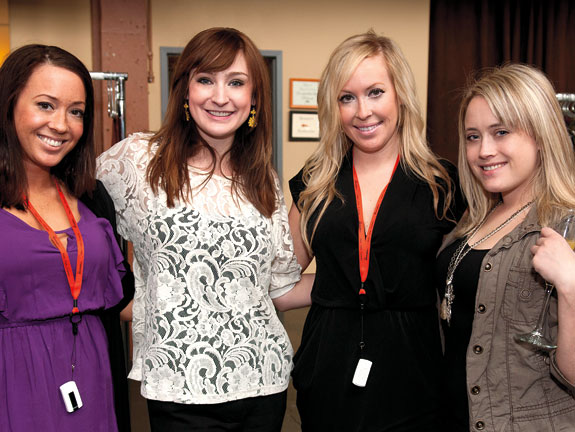This thing called Girl Power is at work well before the scheduled hour of 6 p.m. A peek into Bellevue’s Pure Barre gym one evening in May offers a view of more than a half dozen women in dresses and high heels setting up tables, filling swag bags, and arranging food and cocktails for a crowd. In the middle of the whirl is Darnell Sue ’02 in a dress of black and hot pink, her signature colors, her hair twisted into a chignon, a notepad under her arm.
This is the set up for Girl Power Hour, a “stylish networking event” held the third Thursday of every month in Seattle and nearly as frequently on the east side of Lake Washington. The evening’s themes are “Fit and Fabulous,” hence the location at a women’s gym where the workout includes a ballet barre and dance and Pilates techniques. The sponsors are a protein bar created just for women and a plastic surgeon.

Sue, née Westmoreland, graduated in business and went to work at media jobs including at a record company, a television station, and most recently with a communications group that produces WHERE Magazine for Seattle. In 2007, in the middle of a very corporate annual meeting, she realized she’d rather be doing just about anything else.
It was one of the classic business events with bad coffee and fluorescent lights, she says. “I just wanted to hide until it was over.” Fortunately, she met Samantha Lawton who was having the same experience. The two agreed there must be a better way to socialize and network. Several months later they held their first event for 100 guests at the Shilshole Bay Beach Club in the Ballard neighborhood of Seattle.
The idea was to provide women a social event in a “stylish, non-threatening environment,” says Sue. “Really, it’s about building community.”
That first Girl Power party was easy, says Sue: “That’s because we didn’t know what we were doing.” But with each new event, they added depth and interest, finding new themes and locations and bringing focus to women’s needs and charities, including breast cancer awareness and clothing drives. The themes evolved to include eco-friendly fashion, how to survive (and stay stylish) during a recession, and how to market your brand and your business.
They also turned Girl Power Hour into a club with memberships. GPH members can access special resources on the group’s website, attend events at a discount, and have access to member-only nights at boutiques and spas. Eventually Sue bought out her business partner and is now the CEO and the sole paid employee.
In October of 2009, Sue and her team expanded GPH’s territory to include Bellevue. While the interest there is as great, the women who come through the door are more established in their careers. “It’s a different demographic,” says Sue. “They’re older and more upwardly mobile.”
All the while, Sue has been building her own brand as a “girl about town,” a DJ, and a blogger for the Seattle PI. The rest of the team is made up of volunteers—friends and family who love the idea of Girl Power Hour and for whom the networking service coordinates well with their own interests and businesses.
That networking skill helped Sue find Darcy Camden-Werden, founder and chief stylist of Styled.Seattle, a few years ago at a Seattle Fashion Week event. They both quickly realized how well their two businesses coordinated. “This is a great platform to network and market my business,” says Camden-Werden, as women holding cocktail glasses start filling the room.
“Darnell knows that women are natural networkers,” says Camden-Werden. “And with men out of the equation, it’s so much easier.”
While there have been other similar women’s networking efforts in the Seattle area, says Camden-Werden, few are infused with such flair. Darnell is the best at making it happen, she adds. Sue sees it a little differently. “I’m the nuts and bolts person,” she says. She does the core work of planning and coordinating the events and offerings, but builds off the ideas of her team as far as location, themes, and sponsors. Other members of Sue’s GPH team include her sister Corrie Westmoreland ’02, her cousin Danica Westmoreland ’03, and other local businesswomen with marketing, advertising, sales, and business backgrounds.
This September, Girl Power Hour celebrates its fourth year of events. The clients have changed some, says Sue. Initially more were self-employed. Now 75 percent have jobs with an employer. And while initially most of the participants were in their 20s, it now seems to have a broad appeal, says Sue. The majority of the members are between 25 and 35, and 20 percent are 40 and older, says Sue.
Last October, Sue left her magazine sales job and devoted herself full-time to developing Girl Power Hour. Now that she’s having success in Bellevue and Seattle, she’s planning on reaching out to Tacoma for an event or two in the coming year. And as she continues to refine the formula, Sue hopes to take Girl Power Hour to other states.
“I’m proud we’ve been able to keep people’s interest for this long.” Yes, a lot of what they offer are the ever-popular shoes, cocktails, and swag, says Sue. “But if we can find a deeper purpose in there, all the better.”
